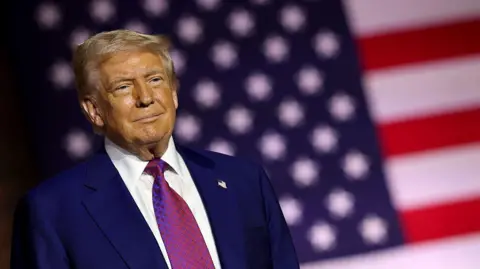In a striking revival of global trade tensions, Faisal Islam discusses Donald Trump’s recent tariff declarations that could potentially unsettle the global economy. His article captures a landscape marked by uncertainty as the United States, under Trump’s administration, appears to reignite its trade conflicts that had seemed momentarily subdued.
The backdrop of this renewed trade war includes a notable threat from President Trump to impose a staggering 50% tariff on all goods imported from the European Union (EU) within a week’s timeframe. This move indicates that the previous calm was merely a facade, allowing tensions between the US and its global partners to simmer beneath the surface. With the upcoming G7 summit in Canada looming on the horizon, market volatility seems poised to escalate dramatically.
Central to the current situation is the shift in US trade policy, especially in light of past negotiations with China, which had seemingly reached a standstill. After pulling back from a confrontational tariff stance that characterized relations with China, other nations, particularly US allies, found themselves hesitant to continue their negotiations. It raises alarm among these nations that the US may treat them unfavorably in comparison to China, compounding fears of an escalating trade conflict.
Islam emphasizes that the situation worsened beyond previous worst-case projections when Trump announced plans for a 50% tariff, far exceeding expectations of a 20% tariff that was initially anticipated to be enacted at the end of a 90-day pause on tariffs. This dramatic pivot was further underscored by a remark from Treasury Secretary Scott Bessent, who indicated that such threats from the president are intended to “light a fire” under stalled trade talks.
Furthermore, skepticism pervades international reactions, particularly among nations like Japan and members of the EU, who suspect that the US administration is engaged in bluffing tactics. Many believe that Trump’s government appears to have backed down against China amid rising inflation and an unpredictably volatile market, suggesting a possibility that it will do so yet again. This environment of distrust is critical as it sets the stage for potential standoffs, where the EU may feel urged to reinstate retaliation measures that they had previously put on hold.
The ramifications of these tensions extend globally, with the UK finding itself in a unique position. Britain’s trade negotiations with both the US and the EU provide a level of insulation to its economy amid these rising forces of conflict. However, a full return to a transatlantic tariff war could produce significant shocks to trade flows that would be hard to mitigate.
In summary, the trade disputes initiated by Trump and his administration create a climate rife with unpredictability, prompting fears of far-reaching consequences on both global and domestic economies. The situation is evolving rapidly, with multiple stakeholders watching closely as international responses unfold against the backdrop of heightened tariffs and renewed confrontations. The continued negotiation pace between the US and other nations will undoubtedly determine the future of global trade relationships and economic health worldwide.



